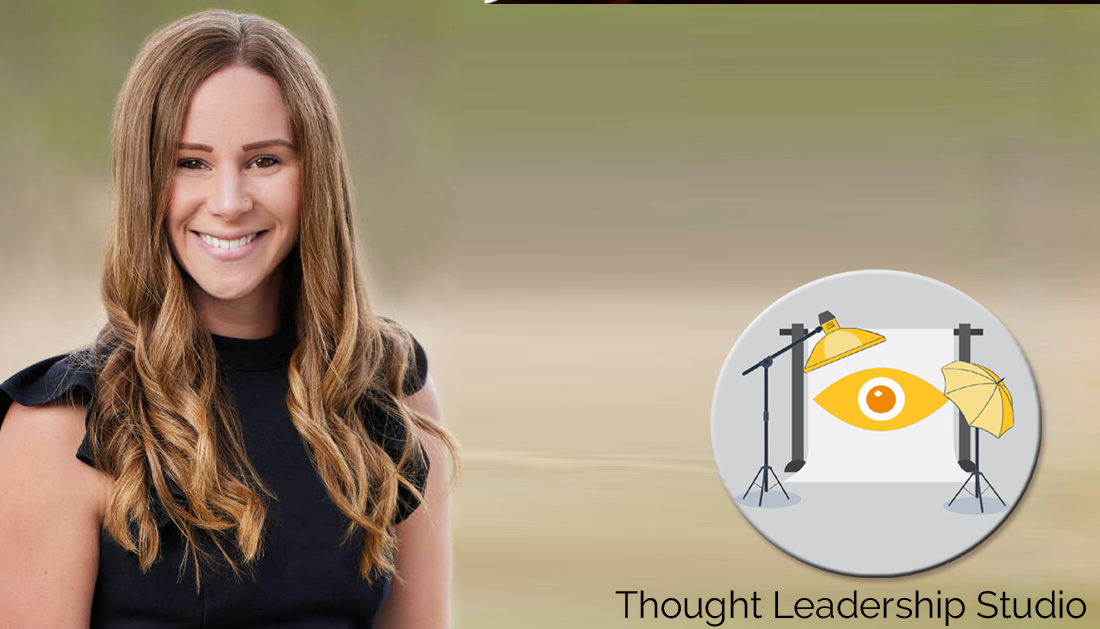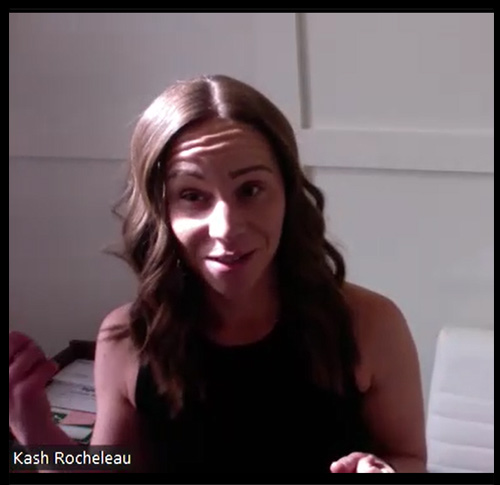Thought Leadership Studio Podcast Episodes:
Empathy-Driven Leadership with Kash Rocheleau
Episode 98 – Walking the Walk in the C-Suite: Leadership Lessons from Business, Parenthood, and Personal Transformation

#coaching, #communication, #consulting, #empatheticleadership, #entrepreneurship, #executivepresence, #influence, #insight, #inspiration, #interview, #interviews, #leadership, #lifebalance, #management, #personalbranding, #strategicthoughtleadership, #systemsthinking, #thoughtleadership, #valuesbasedleadership, #visibleleadership
Or Click here to listen or subscribe on appWhat this episode will do for you
:- Kash Rocheleau’s Leadership Journey: Hear how Kash transitioned from personal training and stay-at-home motherhood to becoming CEO of Icon Foods and fractional CFO of multiple companies.
- Human-Centered Leadership: Learn why leading with kindness, empathy, and compassion isn’t just idealistic—it’s essential for building trust and alignment in modern organizations.
- Walking the Walk as a Visible Leader: Explore how Kash models integrity and congruence in leadership, especially in today’s social media-driven era of heightened transparency.
- Turning Feedback into Strategy: Discover how anonymous employee surveys help Kash identify gaps, foster buy-in, and guide leadership growth through active listening.
- Balancing Accountability with Care: Gain insights on having difficult conversations rooted in mutual respect and how relationship-building enables effective problem-solving across teams.
Kash Rocheleau.
In this episode, I’m excited to introduce Kash Rocheleau, CEO of Icon Foods and fractional CFO for multiple companies, with a passion for mission-driven leadership and strategic growth.
Kash shares her journey from stay-at-home mom and personal trainer to the executive suite, offering powerful insights on leading with kindness, building trust through action, and the importance of “walking the walk” - as she puts it - in a visible leadership role.
We explore how compassion, accountability, and authentic connection can shape culture, inspire teams, and drive long-term business impact in today’s hyper-transparent world.
Some of Kash's coordinates:
Curated Transcript of Interview with Kash Rocheleau
The following partial transcript is lightly edited for clarity - the full interview is on audio. Click here to listen.
Chris McNeil: I'm your host of Thought Leadership Studio, Chris McNeil, and today I am joined across Zoom by a powerhouse in finance, business strategy and leadership - Kash Rocheleau. Kash currently serves as the CEO of Icon Foods where she oversees financial operations, regulatory compliance, and strategic growth in the clean label food manufacturing space.
She's also the CFO of three additional companies, Guy Gone Keto, King Capital Investments, and the Reset Button, an innovative, ADAS calibration service provider. With an MBA in accounting and finance from East Washington University.
Kash brings a sharp analytical mind and a deep understanding of acquisition, negotiation, trademark applications and business strategy behind the boardroom, passionate about mentoring young leaders, championing women in business in driving innovation and health and wellness, which we just talked about.
Great to have you here Kash
 Kash Rocheleau: Thank you so much for having me.
Kash Rocheleau: Thank you so much for having me.
Chris McNeil: Well, this multiple company leadership piece is really fascinating and Elon Musk has taught us this possible to run a lot of companies at once, I suppose.
But we usually start these types of interviews to give our listener who may not already be familiar with you, a little context on where you're coming from by asking about a pivotal moment or a story of a shift in thinking or an event that set you on a path that brought you to where you are today. What would you like to share with a listener about your background that way?
An Unexpected Pivot From Stay-at-Home Mom to CEO
Kash Rocheleau: Yeah, I mean, I have quite a few followers, so I mean, people that have followed and listened to my podcast, they're going to know exactly what I'm going to say here. But when I got married, it was my dream as a kid to get married and to have kids and be the homemaker and the stay-at-home mom. And I was fortunate enough to have that opportunity.
And when I had my first, I about two months later realized that it was not the fantasy that I had drummed up in my head. And I continued to be a stay-at-home mom for about seven months and let this frustration build. My husband would go to work, he would interact with people all day. He would come home and I had been interacting with a toddler all day, and I'm looking for some adult interaction. He's looking for no interaction.
 And it got to this point where I kind of blew up in anger and frustration of like, I got to get back into the workforce. I can't do this anymore. Of course, my husband was like, okay, where is this coming from? And so my turning point into really the career world, the leadership world was realizing that what I wanted was not truly what I wanted. And so I talk about this a lot in what we want. It's okay for it to change and change multiple times, and what we dream up may not always be the reality.
And it got to this point where I kind of blew up in anger and frustration of like, I got to get back into the workforce. I can't do this anymore. Of course, my husband was like, okay, where is this coming from? And so my turning point into really the career world, the leadership world was realizing that what I wanted was not truly what I wanted. And so I talk about this a lot in what we want. It's okay for it to change and change multiple times, and what we dream up may not always be the reality.
Chris McNeil: Well, that's interesting. So was it even a shift in personal values at that point?
Kash Rocheleau: I don't know if there was a shift in personal values. It was ...
Chris McNeil: Or discovery maybe?
Kash Rocheleau: Probably a little bit of stubbornness. But even today, I love being a wife. I find a lot of purpose in it. I am married to a phenomenal person, infinitely better than me. I say on most days, and I love being a mom, but if I bucket my definition of myself, I don't ever want it to be in one singular area.
I don't want to be identified as Kash this mom or Kash the wife or Kash the CEO or CFO. I really want to be looked at for all of my attributes. Some of them are great on certain days and some of them are not so great on those same days. So I want to be identified in all areas of my life, if that makes sense.
Leading with Heart: Compassion as a Core Leadership Trait
Chris McNeil: What is the most important thing to you about your leadership role since that's the context of this podcast? We'll focus a little bit on that.
Kash Rocheleau: I would say the most important part to me is walking the walk for the talk that you're talking, and I just had this conversation with one of my colleagues today about we can have expectations, we can set expectations, and that's completely okay and you should, because it creates a level of boundaries, but you can set expectations that you're not willing to follow yourself.
You lose credibility, you lose respect, or you may never gain traction of the credibility and respect if you're not willing to walk the walk. And I would say further, further on that is it is okay when someone is not walking the walk to have those conversations and what those expectations are. I think very often leaders feel like they need to have those conversations around those expectations, myself included on many occasions. And they become punitive conversations. You're not doing this, you're not doing that.
 You need to be better here. You need to be better here. Instead of shifting the mindset to a kind, compassionate, really empathetic conversation. And I see that you're struggling here to meet these expectations. I'm sure you're already aware as most people are aware when they're failing, but how do we come alongside each other and solve the issue at hand?
You need to be better here. You need to be better here. Instead of shifting the mindset to a kind, compassionate, really empathetic conversation. And I see that you're struggling here to meet these expectations. I'm sure you're already aware as most people are aware when they're failing, but how do we come alongside each other and solve the issue at hand?
So for me, it's really about walking the walk and then being able to have the conversations in a kind, compassionate way when they need to be had.
Chris McNeil: So through the kindness and compassion, you can help another leader walk their talk, so to speak and be congruent is the word I would use for that.
Kash Rocheleau: Yeah.
Chris McNeil: What does that do for you? What's the most important thing about bringing this kindness and compassion to the leadership space?
Kash Rocheleau: I think being a mom, to full circle that intro, I think being a mom really helps being a dad. I'm not a dad, so I can't speak from that context, but I think being a mom really helps shift that perspective because you start to look at people in a way that they are someone's significant other, they are someone's daughter, son, uncle, aunt, sibling, et cetera.
And you kind of start to look through the lens, or at least I do look through the lens of if that was my son or daughter or significant other mother, father, would I be proud of the way that they just got reprimanded or how they got treated. And that mindset took a long time. It took me asking that question a lot and answering, no, with a lot of shame, a lot to realize that we are all people. Some of us are born leaders.
Some of us can uncover some of those traits of leadership. Some of us just aren't leaders, and that's okay too. But in order to grow better leaders, we have to be those leaders. We have to again, walk the walk. I can't expect the leaders one level below me to have kind compassionate, empathetic conversations if I'm not doing it myself, if I'm not teaching them how to do it. And so when you start to climb that ladder and you realize the responsibility you bear, you may only work predominantly with a C suite group or a director level group, but you're responsible for all of the people below you.
And I know most CEOs will feel that way, but you start to realize that my conversation with that one leader has a ripple effect all the way down to the people at the very bottom, maybe not directly, but indirectly at the very minimum. And so when you start to realize that responsibility that you carry and how those leaders will then engage with their direct reports and then those leaders engaging with their direct reports, you have to look at yourself and are you conveying those messages in a way that will ripple all the way down that you would be proud of the people at the bottom having those conversations.
So I would say that the short answer is the responsibility that you carry for all the people that you're serving in the company.
No Place to Hide: Leadership in the Age of Transparency
Chris McNeil: I love that. And to me, that comes across like opening up the frame outside somebody's role in the company, their full expression as a human and all the other people who that impacts. And I love how you bring about how that reverberates through an organization because we've all seen companies that have their stated values on the wall, something like we value our people most, but when sales are down here come the layoffs.
So talking compassion, living compassion can be two very different things. And then the context of what we talk about with thought leadership is bringing this also to our audience and knowing that today's age of the internet, there's this visible leader phenomenon where people bond with people, not with the corporate logo. We can't "hide behind a logo", to borrow a phrase from a guest who taught me that a while back, I'm like, I'm going to use that. That is a great phrase to use.
 We have to be visible these days. How does that equate to how you relate to your audience? You say you have a lot of followers, so you have a lot of people to look up to you for guidance and inspiration. How do you bring about the modeling of leading with heart and compassion in that context?
We have to be visible these days. How does that equate to how you relate to your audience? You say you have a lot of followers, so you have a lot of people to look up to you for guidance and inspiration. How do you bring about the modeling of leading with heart and compassion in that context?
Kash Rocheleau: I think saying it, I think that again, living in a world where social media is so prevalent, it's a blessing and a curse. And my parents didn't have to deal with this in their professional career. My grandparents didn't have to deal with this in their professional career. It was really the context of the walls that they worked in and maybe the context of the walls that their spouse worked at.
That was the comparison, right? And now you have got instant feedback from multiple sources and you no longer can fly under the radar if you are not a great leader. It's going to be uncovered quickly. And so I think that there is a level, for me, there's a level of fear for lack of another term right now, but a level of fear. If I am unkind to these people, it's going to get out there somehow.
And I'm a firm believer that the truth is always somewhere in the middle. I have my version of what happened. They have their version of what happened, and you put those together and somewhere in that middle ground is what really happened. But in this world of social media, if I have an employee that leaves under duress and they go post something on social media about the company in a damaging way, me in a damaging way, another one of my leaders in a damaging way, the readers of that post don't have the context for the other side, right? They're only reading it through the lens of this disgruntled X employee, and that now becomes your truth.
Whether I acted in that way, my leader acted in that way, or the brand acted in that way, that is what the perception is. And unfortunately, perception is reality with all of the social media. And so for me, I think it's a level of fear and protecting myself, protecting the brand, protecting my employees, and ensuring that reputations are intact at the end of the day. And there's still going to be people that go after that, but there's not much I can do about that.
And the strength in numbers, I think pushing down turnover when you're kind to people will stay. And when we have kind compassionate conversations, that doesn't mean that you can't have expectations. It doesn't mean for your example of sales is not meeting quota. It doesn't mean you can't have the conversations about how we get back on track or trying to find the root issue of the lack of meeting quota. But it's how we have those conversations.
And again, I believe if you have them in kind, compassionate, empathetic ways, your team will understand that you have stakeholders, a business to run that needs profitability to survive. They will come alongside you.
Business Runs on Relationships, Not Just Results
Chris McNeil: And you kind of answered, but maybe you could embellish it even more for the listener. The question I was going to, which is: Why is important to bring these relationship aspects to business that we have to balance also with the task of getting business done?
Kash Rocheleau: Yeah, I think relationships are so important because when you build that relationship, you can have those transparent conversations. Being married for almost two decades, we have had a great marriage that I'm very proud of, but I have been mad at my husband before. My husband has certainly been mad at me before.
 And so in that we've built the trust, we've built the respect, we've built the empathy to have those conversations to say, I love you today, but I'm really frustrated with you and we need to find some middle ground here. It may not go my way, it may not go your way, but let's find a road where we can walk down together and both be a little unhappy with the decision. And I think that that translates out into business. If you build that rapport with your salespeople or even with production people, we work in manufacturing that may not be meeting through quotas.
And so in that we've built the trust, we've built the respect, we've built the empathy to have those conversations to say, I love you today, but I'm really frustrated with you and we need to find some middle ground here. It may not go my way, it may not go your way, but let's find a road where we can walk down together and both be a little unhappy with the decision. And I think that that translates out into business. If you build that rapport with your salespeople or even with production people, we work in manufacturing that may not be meeting through quotas.
If you build those relationships, then when you have those hard conversations, you have the foundational respect and trust to know that we're just having a conversation to get to the root problem and to come out together with a solution that we can both agree on. But if you don't build those relationships, then it is going to feel really punitive. You never say, good morning to me, never talk to me, and now sales are down and you are telling me how awful I'm doing.
Again, perception is reality. So I'm a firm believer that relationships are incredibly important. Our company only has 25 employees, and so I live by the principle that I need to know everyone. There's not a reason why I can't know every single employee and our business by first name, what they do, what their goals are, because we're so small, there will come a time where I can't.
But again, it makes it easier when we have those conversations. And I would take it a step further to say, having those tight relationships with, I call it the A team or first team in every organization there's layers of leadership, and where you are is your first team or your A team and so on and so forth.
You've got to have those relationships with that first team because when they have the hard conversations, you're naturally going to have some circumvention. And if you guys are not on the same page, you're going to just destroy that first team relationship giving different information or undermining them in a way when that circumvention happens. So relationship is key in all areas.
How Feedback Becomes a Mirror: Listening to Lead
Chris McNeil: Well, that's a great explanation, and you covered both the upside of doing it in the downside of not doing it. How do you know, and I'm thinking of the listener trying to be their advocate, just thinking, well, how do I know when I'm doing this?
How do you know when you're doing a good job at relationship building in the context of corporate leadership?
Kash Rocheleau: That's a good question. I mean, I don't always know. To be completely transparent, I don't always know. In our company, we've implemented a employee survey. So every quarter we send out an employee survey, and when those results come back, they're all anonymous. So we have no idea who is saying what. We regurgitate that back out, we let them know, look, we see, we identify where you feel like me as the CEO, or we as the leadership team are falling short on our promises or commitments or our obligations to you as employees.
By acknowledging that, I think that that's the first layer of building the trust. I see it. I think that naturally egos don't want to hear where you're falling short. I am no exception. There's times where I'm like, that was hard to hear, or frustration naturally. But hearing those weaknesses or where you're falling short, where you have cracks or holes is a blessing.
 And if you can look at it as a blessing, you can then see, now I have somewhere to start. And if someone is willing to invest in that feedback of whether it negative, positive, I believe there's still buy-in from them. If I send out that survey and get two responses back, that tells me that I have 23 people in the organization that don't care. They don't care enough to respond. They don't care enough because they don't feel like they're going to be heard.
And if you can look at it as a blessing, you can then see, now I have somewhere to start. And if someone is willing to invest in that feedback of whether it negative, positive, I believe there's still buy-in from them. If I send out that survey and get two responses back, that tells me that I have 23 people in the organization that don't care. They don't care enough to respond. They don't care enough because they don't feel like they're going to be heard.
And this is just again, my own internal dialogue, my mindset. But if I don't have participation that tells me that I have employees that are disengaged and don't care. If I'm getting 25 surveys back and it's the same feedback, maybe not feedback that I want to hear, there's still a buy-in there. Otherwise they would not be willing to say what they want to say.
And I find that while they're anonymous, a lot of the feedback is typically very similar. And there's a level of strength in numbers. If you have 25 people saying, man, I wish the CEO would say hello to me in the morning, or I wish the director of sales had conversations with me. When things are positive, not only when things are negative, it's not a coincidence. As much as we don't want to hear that feedback, it's not a coincidence. So for me, I would say implementing surveys is a great way to see where your buy-in is.
And then by implementing those, you have to commit to being willing to work on the areas that are going to be vocalized. If you are not willing, I would say probably don't send out a survey,
Chris McNeil: And it's probably the worst thing to do is to ask for advice and then get it and then not follow it.
Kash Rocheleau: Yeah, yeah.
Leading From the Gym Floor to the Boardroom
Chris McNeil: Well, we've talked a little bit about how you had a background in athletics in the fitness industry and the empathy fatigue you can run into in those situations, which I'm all too familiar with as well.
And now you're involved as a fractional CFO and A CEO and these leadership. Why did you choose this particular path to this kind of corporate leadership?
Kash Rocheleau: I don't know that I chose it. It might not be what your listeners want to hear, but being in athletics my whole life, coming to the other side where I have to start a career, I wasn't really sure where to start. My degree was in business and it was a very general just business administration undergrad degree. And so I just didn't know what I wanted to do. And personal training seemed like an easy way to make money in a field that I was very passionate about in an industry that I had a lot of knowledge.
I knew a lot about the body being an athlete. I knew how to help people attain goals. I also knew how it felt when you attain those goals and realizing that in the fitness world, goals are not always a number on the scale for females. It may just be feeling better or fitting into a new pair of jeans.
 And so it just seemed really natural. And I did it for about five years. And at the end of that five years, I was so exhausted, not with the training, but I had quite a few clients that had been with me for most of that five years. At the end of my tenure in the personal training room, my entire book of business, my shortest tenured client had been with me for three years.
And so it just seemed really natural. And I did it for about five years. And at the end of that five years, I was so exhausted, not with the training, but I had quite a few clients that had been with me for most of that five years. At the end of my tenure in the personal training room, my entire book of business, my shortest tenured client had been with me for three years.
So these were people that I had built relationships with and really invested in their journey. And I was so exhausted mentally when I would get home because I had poured into all of these people. And for those that maybe aren't familiar with personal training, it becomes almost like a therapy session. I mean, you're working them through the paces of working out, aligned with their goals, but they start to feel safe and start opening up about things, and you're like, I didn't really sign up to hear that.
And so I just got to a point where I felt like I was pouring into so many people that I had nothing to pour into them. And I again, felt this responsibility if I could not show up a hundred percent for them, I felt irresponsible showing up at all. So I ended up retiring from the personal training industry, and again, just having a business degree, not knowing what I should do, where my profession lied, I just looked for business roles at business administration roles. And Icon Foods at the time was looking for a executive assistant to the CFO, and I just at the time was like, I won't be in charge of anyone.
I won't be in charge of anything. You can't really mess this up. And got into it and really fell in love with the finance side of things, fell in love with the p and l, the balance sheet, and realizing that you have to take all of these numbers and information and create a story out of the balance sheet and the p and l and the inner workings of what goes into them.
And I really fell in love with that story building aspect. And Icon Foods is in the clean label sugar reduction space. So we're an ingredient company that helps other CPG companies reduce or eliminate sugar in their products. And so I was falling in love with the finance side of things, working in an industry that I lived by. I don't eat a lot of sugar, very cognizant of what goes in my body. And so just really fell in love with the industry and the business and took every opportunity specifically within Icon Foods to learn every aspect.
I went and worked on the production line for a week. I went and got forklift certified. I worked with a couple customers collecting AR and built relationships there. And just really fell in love with what we do and how we make an impact in such a small way. And in that I naturally just kind of climbed the ladder and fell in love with the process and the people.
I mean, at the end of the day, I love what we do at Icon Foods, but it brings me so much joy to see our employees, our customers have those aha moments of, "wow, I just did this, or I just got a promotion or thanks for the advice, Kash". It really helped me close this deal. And so I wouldn't say that I chose it. It kind of fell onto my lap through the process.
***************************************
The transcript is lightly edited for clarity and is a partial transcript- the full interview is on audio. Click here to listen.
***************************************
Free Stuff and Offers Mentioned in Podcast
***************************************
***************************************